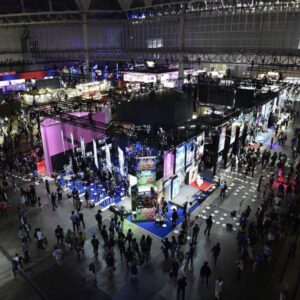 Tokyo Game Show 2024 Showcases Groundbreaking AI Technologies Amid Industry Labor Challenges
Tokyo Game Show 2024 Showcases Groundbreaking AI Technologies Amid Industry Labor Challenges
The Tokyo Game Show 2024 kicked off on Thursday, unveiling cutting-edge advancements in artificial intelligence (AI) aimed at revolutionizing video game development as the industry continues to address a chronic labor shortage.
This year’s event features a record 985 exhibitors from 44 countries and regions, making it one of the largest gaming trade fairs globally. A highlight of the event is the dedicated AI technology pavilion, where various firms are showcasing innovative applications of AI to streamline game development processes and reduce production time.
Among the featured exhibitors is HechicerIA, a Spain-based AI startup that has developed software capable of converting text into 3D video animations almost instantly. By inputting simple descriptions such as “a man approaches a woman in a cabin” or “a man walks through a jungle,” the software automatically generates corresponding 3D scenes, significantly reducing the manual effort required in traditional game design. According to HechicerIA CEO Alvaro Saez, the technology could reduce game development costs by up to 80% and has already attracted attention from major gaming companies. “Our software can rapidly transform scripts into finalized videos or animations,” Saez noted.
In addition, Techno-Speech Inc., a Nagoya-based startup, is demonstrating its AI-driven technology for creating smooth, live commentary for sports video games. This AI service has already been integrated into Konami Digital Entertainment Co.’s latest baseball game, offering a glimpse into the potential of AI in enhancing in-game experiences.
The Tokyo Game Show, held at the Makuhari Messe Convention Center in Chiba Prefecture, has set new records with 2,850 game titles on display. Over half of the exhibitors are from abroad, with 535 foreign firms participating, marking an increase in international presence.
Notable overseas exhibitors include Saudi Arabia’s Qiddiya, which is building a massive entertainment city outside Riyadh. The project, which includes a stadium, Formula One track, e-sports facilities, and the world’s first theme park dedicated to the popular anime series Dragon Ball, reflects the country’s efforts to diversify its economy by investing in entertainment.
In terms of major announcements, Sony Interactive Entertainment Inc. made its return to the Tokyo Game Show after a five-year hiatus, debuting its latest console, the PlayStation 5 Pro. This new model, set to release on November 7, features enhanced graphics processing units (GPUs) for superior image quality, underscoring Sony’s commitment to maintaining its leadership in the gaming hardware market.
Popular gaming companies such as Square Enix Co. and Capcom Co. also revealed updates to their flagship titles, including the next chapters in the iconic Dragon Quest and Monster Hunter series, further fueling excitement among attendees.
The four-day event is expected to attract approximately 250,000 visitors. The first two days are dedicated to industry professionals and media, with general admission beginning on Saturday. Tickets for the general public, priced at 3,000 yen ($21) per day, must be purchased online in advance, with free admission offered to children of elementary school age and younger.
Since its inception in 1996, the Tokyo Game Show has grown into one of the most influential gaming events in the world, especially in Asia, alongside Germany’s Gamescom. As other major events like E3 have been discontinued, the Tokyo Game Show continues to stand as a premier showcase of the gaming industry’s future.
